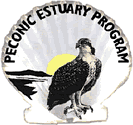EPA
Peconic Bay Estuary ProgramThe geographic area for PBEP is entirely within eastern Suffolk County, New York between the north and south forks of Long Island.
Peconic Bay Estuary ProgramThe geographic area for PBEP is entirely within eastern Suffolk County, New York between the north and south forks of Long Island.
EBSCO General Science Collection
eLibrary Science
Science Reference Center
Proquest K12
Online Catalog
Academic Intergrity
NoodleTools Citations System
Citation Machine
Parenthetical Citations
Proquest K12
Online Catalog
Academic Intergrity
NoodleTools Citations System
Citation Machine
Parenthetical Citations
Objective: To learn about estuaries; the environmental conditions and the organisms that live in them.
Learning Goals:
Ø to learn about estuaries and the importance of salt marshes for the environment
Ø to learn about some of the animals and plants that inhabit salt marshes
Ø to learn how organisms have adapted in order to survive in a salt marsh environment
Directions: You may work in groups of two or individually. This Research Assignment will count as a project grade. Your final report should include the following:
v Cover
v Background Research Questions
v Map of Long Island showing Peconic Bay
v Summary of your organisms.
v Horseshoe Crab Summary
v Graphics: Pictures of your organisms.
v References Cited
Vocabulary:
Estuary - ________________________________________________________
Salt marsh - _______________________________________________________
Invertebrate - ______________________________________________________
Vertebrate - ________________________________________________________
Epifaunal - _________________________________________________________
Infaunal - __________________________________________________________
Benthic _____________________________________________________________
Pelagic - ____________________________________________________________
Planktonic - __________________________________________________________
Salinity - ____________________________________________________________
Brackish - ___________________________________________________________
Name__________________________________ Date _________________
Science Research 1 Mr. Vorwald
Estuary Research Project
I. Background Research:
1. What is an estuary?
2. How does the salinity of an estuary compare to the salinity of the ocean?
3. What is a salt marsh?
4. Where are salt marshes located?
5. What do marshes do for the environment?
6. How do tides impact life in the salt marsh?
7. What plants and animals live in or near salt marshes?
8. What is the difference between invertebrates and vertebrates?
9. What are three or four conditions that organisms need to adapt to in a salt marsh?
10. How have to organisms adapted in order to survive in a salt marsh environment? Give at least three specific examples.
II. Map: Find and print out a map of Peconic Bay or Long Island Sound as an example of an estuary.
III. Organism Summary
Research one invertebrate lives in Long Island Sound or Peconic Bay. Explain how it feeds and how it lives. For example, does it attach to the sea floor and filter water? Is it infaunal or epifaunal? Include some interesting features about it.
IV. Horseshoe Crab Description Do some research about horseshoe crabs.
Ø What kind of animal is a horseshoe crab?
Ø What living organisms are they most closely related to?
Ø When and where do they usually lay their eggs?
Ø What adaptations do they have that helps them survive?
Ø How long do they live? When are they old enough to mate?
Ø Do they migrate?
Ø Where do they live?
Ø Describe their adaptations for sight.
Ø What is special about their blood? What do humans use horseshoe crabs for?
Ø When did these organisms first appear in the geologic record
Ø Why do you think the group has survived for millions of years unchanged?
V. Graphics: Include an image of your organism, and 4 others that live in the salt marsh. Include a picture or illustration of a salt marsh.
VI. References Cited: Use the MLA format to record your references. Include proper format for websites and published sources.
